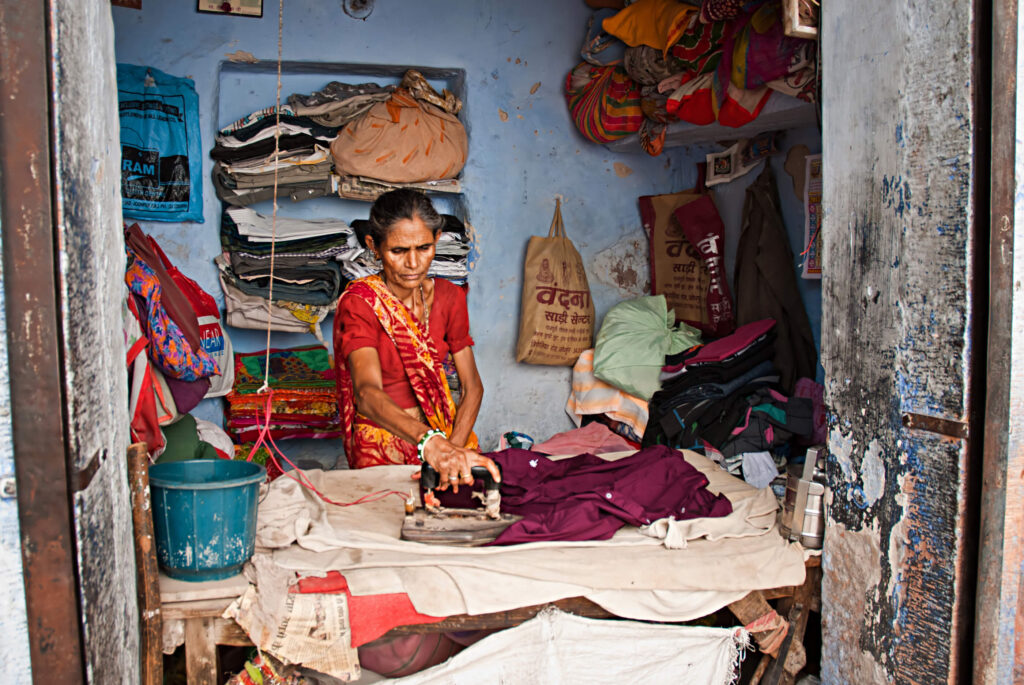
On the outskirts of sprawling Delhi, 34-year-old Maya opens her kirana, a small grocery store, for the day. Sleeves of shampoo packets and dry snacks line the walls around the counter where Maya serves up to 80 customers on a good day. She accepts payments in cash as well as digital payments on her smartphone, thanks to India’s successful Unified Payments Interface (UPI) system. However, while Maya’s name is registered as the business and bank account owner, she does not know much about the bank account or the business finances beyond her handwritten ledger book. Instead, her husband manages the banking relationship, and she must ask him for more cash or information about the account balance.
Many registered businesses are owned and managed by women only on paper; their lived realities are much different.
According to the Indian Ministry of Micro, Small & Medium Enterprises (MSMEs), women only own 20 percent of Indian MSMEs. While this is already a small figure, interviews conducted in March 2023 with 38 women business owners in India suggest that this number may be even lower. Many registered businesses are owned and managed by women only on paper; their lived realities are much different.

Challenging Existing Norms
Providing financial services to women in low- and middle-income countries does not necessarily result in economic empowerment if women do not or cannot make the decisions about their finances. Of the Indian women micro- and small-business (MSE) owners interviewed, over one-third relied on a man — typically a husband or brother — to manage or assist in their use of financial services, even if the woman was the registered owner of the business and bank account. When asked why, women said it was because of personal preference, a lack of confidence in operating the account, or that it was the man’s choice. This was true of interviewees with a master’s degree as well as those with lower levels of formal education, illustrating the pervasiveness of gender norms across education levels.
Managing the business’ day-to-day finances extends to resolving issues with a bank or fintech. Women who rely on their husbands or brothers to operate their bank accounts will often wait for them to contact the agent — who is usually a man — to resolve any complaints. This process is time-consuming and causes friction in women’s daily business activities. Consequently, these women may turn away customers if they do not have enough cash or lack information on accessing financial services for business improvement or growth.
For women in India to fully realize their economic contribution to the Indian economy, we must challenge and change existing norms. The current lack of equality represents a missed opportunity as bona fide access to formal financial services enables women to build their assets and wealth, improving their wellbeing and the wellbeing of their families.
Benefits for Women and Businesses
The burgeoning fintech sector has the pivotal opportunity to create better outcomes for women. India’s fintech sector is one of the fastest growing in the world, with approximately USD $35 billion invested, more than doubling India’s share of global fintech funding since 2016. However, many fintechs are “gender-neutral” and do not design intentionally for diverse genders, reinforcing discriminatory gender norms. For example, because women tend to have lower rates of digital transactions or formal financial assets, it can be more challenging for them to meet loan eligibility requirements. When fintechs have a gender-neutral approach, the gender gap is 28 percent higher than the gap for bank accounts or smartphone ownership.
Many fintechs are “gender-neutral” and do not design intentionally for diverse genders, reinforcing discriminatory gender norms.
Advancing gender-intelligent changes and developing strategies to overcome women’s specific constraints can help fintechs tap into the $216 trillion global market controlled by women. Research by the Financial Alliance for Women shows that fintechs could see a 70 percent increase in revenues by converting new women customers at the same rate as men. While building economic power for women on its own is a compelling reason to inspire change, this financial incentive is an additional driving force for investor-backed and profit-driven fintechs to prioritize gender-inclusive design and compete in an increasingly crowded market.
Increasing Diversity Is a Crucial Driver of Change
One fundamental way that fintechs can adapt their strategies to benefit women is by increasing their organizational diversity. From its interviews with the Inclusive Finance 50 fintech winners, CFI found that women-led fintechs were more likely to explicitly target and serve more women customers and report gender segmentation data, which is necessary for gender-intelligent decision making. This staff diversity should extend to customer-facing roles, such as the agents and distributors interacting with women customers, and women business correspondents are critical in expanding financial inclusion. Interfacing with women staff makes it easier for women business owners to manage financial matters as women place a higher value on building personal relationships with agents and building trust over time.
Women-led fintechs were more likely to explicitly target and serve more women customers and report gender segmentation data.
Investors and regulators can also incentivize and require fintechs to make these changes. For example, through gender lens investing, Women’s World Banking works toward higher social and financial returns. Their in-depth approach uses fintech data to develop customized, strategic Gender Action Plans, and their first fund saw an 83 percent increase in women reached by portfolio companies.
Although fintechs alone cannot bring about an overnight transformation in societal and gender norms, taking these steps represents a real and immediate opportunity to initiate change for the economic empowerment of women in India and beyond.
Camilla Nestor, Advisory Council Member of CFI and CEO of MCE Capital, teaches a financial inclusion course at Columbia’s School of International and Public Affairs (SIPA). Each year, the course features a writing competition that gives students an opportunity to write a blog post on a topic of their choice related to inclusive finance. This piece was written by the winner of the 2023 writing competition, Nina Liew.
This work is inspired by a graduate research project conducted by students at Columbia University’s School of International and Public Affairs in consultation with CFI and with support from LEAD at Krea University. Nina and the team of graduate students focused on digital financial inclusion and consumer protection for women MSE owners in India. They interviewed 38 women MSE owners, bank and fintech agents, and fintech executives in India in March 2023.
Note: The story in this post was created as an amalgamation of interviewees.










